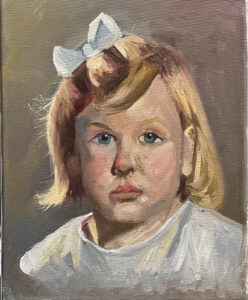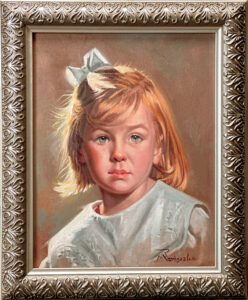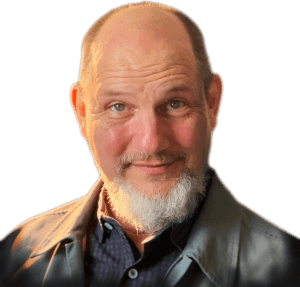
Gates by Erin Cole

Gates head study by Robert Maniscalco
When I teach privately I like to use the paint along process, where the student paints along as I demonstrate. This is how I learned, sitting next to my father and painting what he painted. I call it full immersion study. It usually works out as a win-win. The student learns the process of building a painting from the beginning to the end and we both end up with a nice painting. Erin actually started out as a member of a small group class, which ended up with one student, due to conflicts, etc. I must say, she took to the process very well. Left is her first ever oil painting. I think its pretty good. With a little more time before drying to work, it has the bones to be an excellent portrait. It’s pretty darn good just the way it is.
The process of imitation is an excellent way to learn. The key to success learning my method, is to let go of the ideas about what you know and dive in saying “yes.” We devote ourselves to seeing what is really there and not what we think should be there. It is called honest observation. There are a lot of different approaches and methods out there so I am not upset if someone wants to learn a different process than what I’m teaching. I suggest they should find another teacher that teaches that method. But when I study with a master teacher, someone who is doing something I want to be doing, I try my best to do exactly what they tell me, as if I’ve never painted in my life. That way I get the full benefit from their teaching. It takes courage to come out of our comfort zone, so I try to be very encouraging when I teach. I’ve learned that giving up our ego is not at all the same thing as giving up my our self.
And by the way, when I say method, I’m talking about a process, a way of seeing and working, not a style. My method is a process passed down through the ages, from master to apprentice and has evolved over the last two centuries. Most known representational artists we can name, working in this period from Cézanne to Wyeth, Van Gogh to Sargent, paint in this way. Basically, rather than doing a careful drawing and filling it in with paint, being careful not to disturb our precious drawing, we start instead with the Gestalt and build out large solid forms, dividing them by value. Then, we break these larger masses into smaller and smaller ones, as dictated by our taste. This process began with Cézanne, who is considered the father of modern painting. It was quantified by Frank Reilly in the middle of the last Century. I find the former “filling in the lines” method stilted and cumbersome. Interestingly, very few, if anyone in Charleston, are familiar with this value-based drawing and painting method. I have put my entire drawing and painting process into my user friendly book, The Power of Positive Painting.

 Would you like to get inspiration in your inbox, rather than ads for more stuff? Welcome to ManiscalcoGallery.com
Would you like to get inspiration in your inbox, rather than ads for more stuff? Welcome to ManiscalcoGallery.com